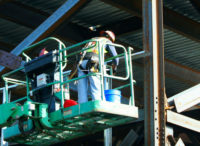Trump Floats Proposal for Infrastructure Fund
GOP nominee says it would be at least twice the size of Clinton's $275B proposal

Law and Order Trump barely referenced construction-related issues in accepting the GOP nomination, but did mention roads and bridges. Photo by Ron Sachs/Picture-Alliance/DPA/AP Images
After saying little about construction issues in his acceptance speech at the Republican convention, the party's nominee, Donald Trump, has proposed a major infrastructure rebuilding program.
In an Aug. 2 interview with Fox Business Network, Trump said he supports a "fund" that would "at least double" the $275-billion plan that his opponent, Democratic nominee Hillary Clinton has proposed. Trump provided few specifics, except to say that the fund would be composed of bonds.
He said, "We will rebuild our infrastructure with that fund and it'll be a great investment. And it's going to put a lot of people to work."
In his July 21 speech at the the GOP convention in Cleveland, Trump did refer to the state of the nation's infrastructure. He said, "Our roads and bridges are falling apart." Further, he likened airports in America to those in the Third World.
Trump's other goals included changes to the immigration system and pulling out of free-trade agreements, such as the Trans-Pacific Partnership, when such trade deals hurt American jobs and workers, he said.
The GOP platform, which delegates to the party’s convention adopted on July 18, did cover a range of construction topics.
The platform calls for an "all-of-the-above” energy strategy that would try to revive the ailing coal industry and boost other fossil-fuel development. It would repeal the Clean Power Plan, the controversial centerpiece of the Obama administration’s strategy to address climate change.
The platform document states, "The Democratic Party does not understand that coal is an abundant, clean, affordable, reliable domestic energy resource. Those who mine it and their families should be protected from the Democratic Party’s radical anti-coal agenda.”
At a July 20 panel discussion sponsored by Politico at the convention, Karen Alderman Harbert, president and CEO of the U.S. Chamber of Commerce’s Institute for 21st Century Energy, said the Obama administration has paid lip service to its mantra of having an "all-of-the-above" energy policy. Harbert said the GOP plan would not shy away from pushing for more development of coal and other fossil-fuel projects.
The platform also advocates converting the Environmental Protection Agency into "an independent bipartisan commission," similar to the Nuclear Regulatory Commission, "with structural safeguards against politicized science."
Rep. Kevin Cramer (R-N.D.), also speaking on the panel, added, "First, we have to stop the bleeding," referring to the number of coal plants that have been shuttered in recent years. He said these closures were largely a result of the Obama administration's clean-air and climate-change policies.
Other recommendations in the GOP platform include repealing the Davis-Bacon Act, which requires paying prevailing wages, often union-scale, on federal construction projects.
The platform also recommends phasing out federal funding for transit, saying public transportation is “an inherently local affair that serves only a small portion of the population.” Further, it opposes increasing the federal gasoline tax, which has stood at 18.4¢ per gallon since 1993.
The American Public Transportation Association strongly opposes the transit funding phase-out, APTA Acting President and CEO Richard A. White said in a July 19 statement. He said, "Having no federal funds would be devastating" to riders, employers and local communities.
APTA notes that federal funds accounted for more than 40% of total transit capital spending in 2013 and expenditures still fall short of the level needed to improve the infrastructure and systems' performance.
The platform also says that federal funding for some other non-highway programs should wind down, including recreational trails, sidewalks, ferry boats, access to federal lands and historic preservation. The document does add that the non-highway projects are "worthwhile enterprises" that "should be funded from other sources." It doesn't specify those sources.
Party platforms are general documents and statements of principles. David Bauer, American Road and Transportation Builders Association senior vice president for government relations, says, “The platforms are intended to be the respective parties’ vision for the country and their priorities.”
The document isn’t “trying to assess what can pass, what can be implemented. It’s just ‛Here is the world as we think it should be,’ ” Bauer adds.
Brian Deery, senior director of the Associated General Contractors of America’s highway and transportation division, says a party platform “includes broad statements about a lot of issues that get the most consensus within the party but, significantly, lacks specifics.”
He adds, “It clearly is not a legislative agenda as much as it is broad ideas.”
If Republicans decide to turn controversial platform items, such as the transit proposal, into detailed legislative language, Democrats have enough Senate votes in the current Congress to block them.
Even if Trump were to win the White House in November, getting the GOP platform items through the next Congress still would require a wider Senate Republican majority, which forecasters say isn’t likely.
The nonpartisan Rothenberg & Gonzales Political Report says the “most likely” Senate outcome is the Democrats picking up three to seven seats in November. Democrats need a net gain of four Senate seats to regain the majority, the report notes.
Story updated on Aug. 2 with Trump comments about an infrastructure fund.




